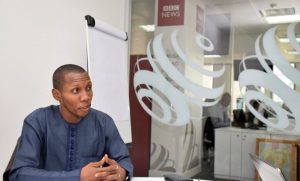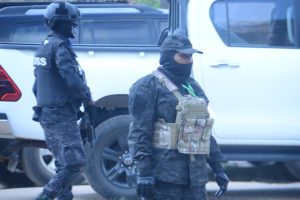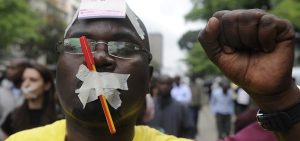DSS Arrests Investigative Journalist Adejuwon Soyinka at Lagos Airport
In a shocking incident, the Department of State Services (DSS) arrested Adejuwon Soyinka, a prominent investigative journalist, at Lagos’ Murtala Muhammed International Airport. This occurred on Sunday, August 25, 2024, shortly after he arrived from the United Kingdom on a Virgin Atlantic flight. His arrest raises serious concerns about press freedom in Nigeria.

Witnesses reported that DSS officers took Soyinka into custody around 5:40 AM. He had just disembarked from the aircraft. A close associate shared a distress message, stating that officials did not provide a reason for his arrest. Furthermore, Soyinka has been held incommunicado. Friends have attempted to reach him by phone, but they have been unsuccessful. They express deep concern for his well-being.
The DSS has yet to issue an official statement regarding Soyinka’s detention. When asked for comments, DSS spokesperson Peter Afunanya said, “I am not aware of the matter you have raised and have no comments on it.” This lack of transparency fuels speculation and concern among journalists and human rights advocates.
Soyinka’s arrest is not an isolated incident; it reflects a growing trend of government crackdowns on journalists in Nigeria. For example, just days before, another journalist, Isaac Bristol, faced detention by the Nigeria Police Force under accusations related to the Official Secrets Act. Such incidents highlight the increasing risks journalists face in the country. They often find themselves at odds with a government sensitive to criticism.

The implications of Soyinka’s arrest extend beyond his personal safety. They raise critical questions about press freedom in Nigeria, where journalists have historically faced intimidation and harassment. The arrest of a prominent figure like Soyinka could deter other journalists from pursuing investigative stories. They may fear similar repercussions.
Press freedom advocates have condemned the DSS’s actions. They call for immediate clarity on the reasons behind Soyinka’s arrest and demand his release. Organizations such as the Committee to Protect Journalists (CPJ) and Amnesty International emphasize the need for governments to uphold journalists’ rights. Journalists should operate without fear of persecution.
In recent years, Nigeria has seen a troubling increase in harassment, detention, and violence against journalists. The government’s response to dissenting voices often involves legal threats, arrests, and even physical attacks. This environment creates a chilling effect, stifling free speech and limiting public access to information.
The international community is closely monitoring the situation. Activists and foreign governments express their concerns, urging the Nigerian government to respect human rights. They want journalists to perform their duties without interference. The ongoing situation surrounding Soyinka’s arrest may become a pivotal moment for press freedom in Nigeria. It could draw more attention to the challenges journalists face in the region.

As the story develops, many wonder about the fate of Adejuwon Soyinka and the broader implications for journalism in Nigeria. The need for transparency and accountability from the government has never been more pressing. Advocates for press freedom continue to rally support for Soyinka. They emphasize that his work is vital to a democratic society where citizens are informed and empowered to engage with their government.
The arrest of Adejuwon Soyinka serves as a stark reminder of the challenges journalists face in Nigeria. As the nation grapples with governance, corruption, and human rights issues, the role of the press remains crucial. Journalists like Soyinka play an essential part in holding power to account and ensuring that the voices of the marginalized are heard.
The unfolding situation demands urgent attention from both local and international communities. As calls for justice grow louder, many hope that Adejuwon Soyinka will soon be released. They also hope that the Nigerian government will reaffirm its commitment to protecting press freedom.
In the coming days, it will be essential for the media and civil society to remain vigilant. They must advocate for the rights of all journalists and ensure that their voices are not silenced. The world is watching, and the future of press freedom in Nigeria may depend on the outcome of this critical moment.

